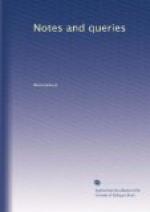R.O.
Eton, Nov. 26. 1849.
Letters of Mrs. Chiffinch.
The Chafins, of Chettle, in Dorsetshire, possessed at one time some interesting family memorials. In the third volume of Hutchins’s Dorset, pp. 166, 167., are printed two or three letters of Thomas Chafin on the battle of Sedgemoor. In a manuscript note, Hutchins alludes to letters, written by a female member of the family, which contain some notices of the court of Charles II. Can your Dorsetshire correspondents inform me whether these letters exist? I suspect that the lady was wife of the notorious Chiffinch; and she must have seen and heard strange things. The letters may be worthless, and it is possible that the family might object to a disclosure of their contents. The manuscript memorandum is in Gough’s copy of the History of Dorset in the Bodleian Library.
J.F.M.
Sangred—Dowts of Holy Scripture.
In the will of John Hedge, of Bury St. Edmund’s, made in 1504, is this item:—
“I beqweth to
the curat of the seid church iiij_s_. iiij_d_. for
a
sangred to be
prayed for in the bedroule for my soule and all my
good ffrends soulls
by the space of a yeer complete.”
In the same year Thomas Pakenham, of Ixworth Thorpe, bequeathed 6 hives of bees to the sepulchre light, “to pray for me and my wyffe in y’e comon sangered;” and in 1533, Robert Garad, of Ixworth, bequeathed to the high altar ij_s_. “for halfe a sangred.”
Can any of your reader explain what the sangred is? or give me any information about the book referred to in the following extract from the will of William Place, Master of St. John’s Hospital, Bury St. Edmund’s, made in 1504:—
“Item. I
beqweth to the monastery of Seynt Edmund forseid my
book
of the dowts of Holy
Scryptur, to ly and remain in the cloyster,”
&c.
BURIENSIS.
Catsup, Catchup, or Ketchup.
Will any of your philological readers be so obliging as to communicate any note he may have touching the original or definition of the word Catchup?
It does not appear in Johnson’s Dictionary. Mr. Todd, in his edition, inserts it with an asterisk, denoting it as a new introduction, and under Catsup says, see Catchup. Under this latter word he says—“Sometimes improperly written Ketchup, a poignant liquor made from boiled mushrooms, mixed with salt, used in cooking to add a pleasant flavour to sauces.” He gives no derivation of the word itself, and yet pronounces the very common way of spelling it improper.
What reference to, or connexion with, mushrooms has the word?—and why Catsup, with the inference that it is synonymous with Catchup?
G.
“Let me make a Nation’s Ballads, who will may make their Laws!”




